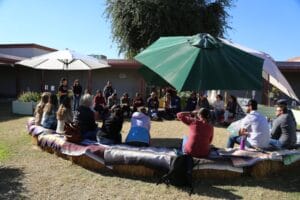
By: Jocelyn Moguin, ASU Sustainable Food Systems graduate student.
Garfield Elementary School, located in Phoenix, Arizona, is pioneering the Farm to School movement through science, nourishment, leadership, sustainability, collaboration, and social and emotional aspects.
In December of 2022, Arizona State University Sustainable Food Systems Graduate Students had the opportunity to explore integral parts in food systems through a weeklong immersive experience across the state. Of these places, Garfield’s Garden on the Corner at Garfield Elementary School was a truly inspiring stop.
This program, spearheaded by Mollen Foundation, is setting the bar high for Farm to School across the country. Rather than focusing only on growing local produce, Garfield Elementary is providing education and life skills, as well as improving school lunches. This program is possible through dedication, passion, collaboration, and support from the community. Garfield’s Garden on the Corner is a shared-used project developed by Mollen Foundation in partnership with the Phoenix Elementary School District. Community collaboration is at the core of the Garfield’s Garden on the Corner.
The garden for Garfield Elementary is a program offering opportunities to integrate cooking, botany, and soil health into classroom curriculum. There are also many ways that school gardens can connect to common classroom subjects such as science (e.g., photosynthesis, life cycles, weather), math (e.g., problem solving, measurements, comparisons), language arts (e.g., journaling, research), and social studies (e.g., history of agriculture, nutrition/culture relationship). The program focuses on grades 4 through 8 where each grade level advances in development of leadership, culinary, and gardening skills.
Furthermore, multiple studies (study 1, study 2) have demonstrated that school gardens can improve academic performance, particularly in science. Another study conducted in Germany determined that learning activities in school gardens can significantly promote emotional and social competence.

Once our graduate cohort arrived at the elementary school, we were greeted with a beautiful garden plot with an array of biodiversity. We were then led to the back where we participated in an open circle activity. The open circle represents a space where all are equal. The open circle gives the opportunity to practice communication and active listening. It gives a space where the children can be comfortable, connect with each other and nature, and process the curriculum. We were then led on a tour of the garden which included a chicken coop and a classroom where teaching and culinary training occurs. When not in the garden, the students are in the classroom working on in-classroom education.
The local non-profit Mollen Foundation provides management for the school garden program at Garfield Elementary School. Paige Mollen, co-founder, and Katie Poirier, Executive Director*, are both alumni of the ASU MS Sustainable Food Systems program. As seen at Garfield Elementary, Mollen Foundation is dedicated to gardening and growing healthy habits for students that will expand to future generations.
*Since our visit, Katie Poirier has taken on a new role as Executive Director of nonprofit Garden to Table.
This blog is part of a series from the December 2022 Arizona immersive component of the MS in Sustainable Food Systems Program. Students toured the state, meeting with farmers, ranchers, entrepreneurs, government staff, and non-profit leaders.